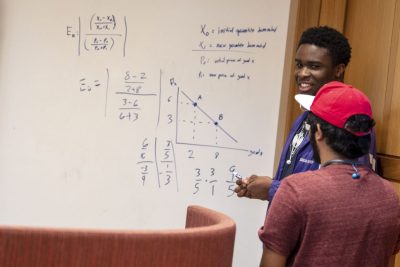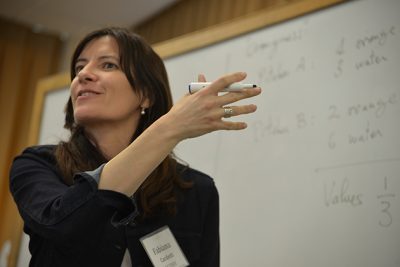Editor’s Note: The following piece was originally published by UConn Today.

Todd Campbell has received grants from the NSF and Google to make next-generation science education more justice-oriented and accessible.
Neag School of Education professor of science education Todd Campbell is working on two grants focused on expanding the diversity and accessibility of science education in Connecticut and beyond.
The first grant is funded through a $1.5 million National Science Foundation grant. The project will develop and implement a unit on the science of COVID-19 through a social justice lens, while also supporting groups of teachers to develop, test, and refine justice-centered instructional practices in local schools.
Campbell’s team on this project includes April Luehmann from the University of Rochester and Déana Scipio from IslandWood, an environmental education non-profit in Washington state.
The COVID-19 pandemic has had a disproportionate impact on racial and ethnic minority communities. Researchers found that racial and ethnic minorities in the United States were disproportionately more likely to catch and die from COVID-19.
Meanwhile, states have been challenged with implementing Next Generation Science Standards. These standards focus on integrating concepts across units rather than teaching everything as discrete entities. The standards aim to provide students with applicable knowledge about core science and engineering principles by ensuring content is taught in the context of its application in explaining events that happen in the world or solving problems.
“COVID Connects Us” will bridge these two contemporary issues by creating a justice-centric science teaching approach.
This work is based on the evidence-based premise that students are more motivated when they can apply what they are learning to real-world events and problems. Developing creative solutions for problems meaningful to them also allows students to practice the kind of critical thinking engineers and other scientists use every day.
“Students need to develop a critical lens about what science is studied … and who is left out of what is studied to understand how science is impacted.”
— Todd Campbell, Professor and Department Chair
This project will work to initiate an important shift in how science is taught and, in turn, how students understand it.
“Students need to develop a critical lens about what science is studied, how it is studied, and who is left out of what is studied to understand how science is impacted by issues of power and to engage in more just forms of participation,” Campbell says.
This work will create a model of science education that puts justice, students, and culture at the center of its practice, known as justice-centered ambitious science teaching (JuST).
The team will work with a network of secondary science teachers in Connecticut, New York, and Washington. The approximately 20 learning communities will each implement an intentionally anti-oppressive unit on the science of COVID-19. This unit will focus on not only the science of the virus itself, but the pandemic’s social justice impacts.
This project will develop an evidence-based understanding of how to make JuST principles successful in the classroom for both teachers and students.
Campbell’s second project is funded through an $80,000 Computer Science Education Award from the Google Fund to Support Math and Science Teacher Learning. Campbell is working with UConn colleagues Derek Aguiar, assistant professor of computer science and engineering, and Megan Staples, associate professor of mathematics education.
Data science and artificial intelligence (DS&AI), concepts core to the discipline of computer science, are becoming an increasingly ubiquitous part of people’s lives. DS&AI are used for everything from disease diagnoses to loan decisions to fraud protection.
However, education about these topics is traditionally limited to advanced college-level computer science or statistics courses. Furthermore only 30% of urban communities, where a majority of Connecticut’s Black and Hispanic youth live, teach computer science compared to 77% of suburban community and 81% of rural communities. Another disparity is that only 29% of students who took the Advanced Placement Computer Science test, which allows students to earn college credit from scoring well on the exam, in 2020 were female.
Campbell and his collaborators will work to democratize computer science education, dismantling the conservative notion that one needs a sophisticated background in math or computer science to engage DS&AI topics.
Currently, little research supports understanding how to teach computer science topics in secondary schools.
Campbell’s group will combine computer science education with social issues relevant to DS&AI. The ultimate goal of this effort is to increase enrollment, retention, and diversity in computer science programs and fields.
The group will identify the tools teachers need to effectively teach computer science topics and for students to learn them.
Educators will teach engaging units that use computer science concepts to address real-world problems like pharmaceutical drug side effects or the impact of climate change on bird migration.
Incorporating computer science concepts into the fabric of high school science courses throughout the state will help level the playing field for all students to learn about and work in this increasingly relevant field.
Campbell holds a Ph.D. in curriculum and instruction from the University of Iowa. His areas of expertise include science education, secondary education, teacher education, professional development, and formal and informal science learning.



